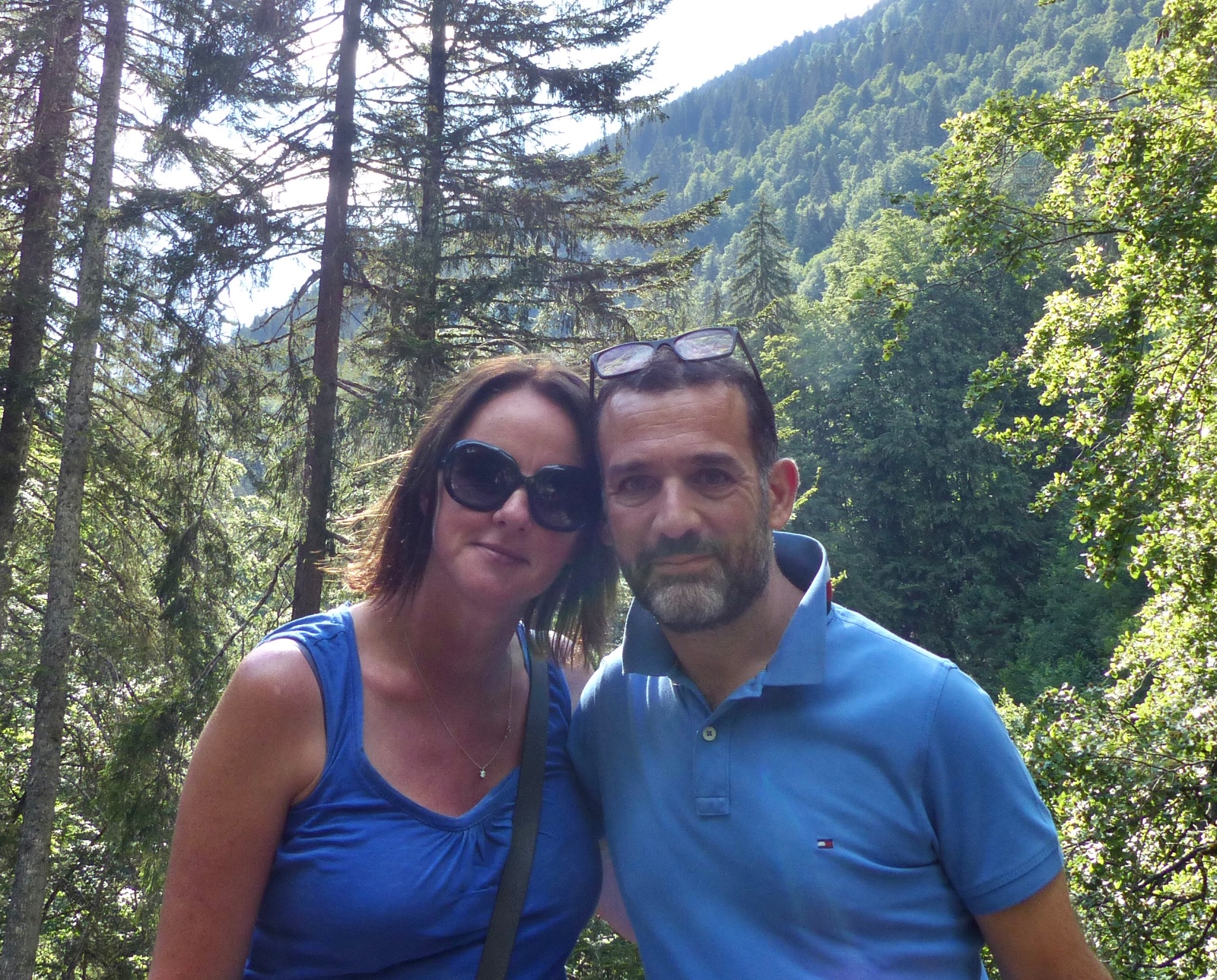‘I was given five years to live before a stem cell donor changed everything’
In a second interview to mark the 27th yahrzeit of Sue Harris, Jewish News meets James Whitehill, given a second chance at life following the discovery of an aggressive type of blood cancer
A 57-year old from London has been given a desperately needed lifeline by a stem cell donor he has yet to meet.
Telling Jewish News it was all “pretty much out of the blue”, father of two James Whitehill was diagnosed with a very aggressive and life limiting blood cancer called Myelofibrosis in February last year following some routine blood tests. It took over three months for the doctors to work out what it was. When they were finally able to diagnose what was wrong, they realised it was serious.
Whitehill didn’t have any notable symptoms and says: “I was lucky that my wife Tina told me to get myself checked it out. The only symptom I had was itchy skin on my legs after a shower.”
Together, the couple saw “countless specialists, and ended up going to Guy’s and St. Thomas’s to see the specialist there. We had a diagnosis at a hospital in Sutton, and then went to Kingston, who referred us to Guy’s to ‘hear the diagnosis and the risks to life expectancy, but also to hear that if you can get a donor and have a transplant, you could be ok’”.
Referred again to UCL, James met Donal McLornan, a renowned specialist in Myelofibrosis, who told him he was a good candidate for a stem cell donor as he was relatively young, and fit and healthy.
Whitehill says it took between February and October “for it all to get sorted out”, working with the international database run by DKMS, a German organisation working in the UK with the Sue Harris Trust, to recruit adult stem cell donors for patients with blood cancer.
He adds: “It takes a long time to process a donor. It’s not just a blood match. It needs to be a blood tissue type match and the donor needs to be fit and healthy too. There may be issues with illnesses they may have had, and I haven’t or vice versa. It’s also very ethics-focused, as the hospital has to take their time and be gentle so that they are not putting pressure on the donor, who has to get advice on his side and confirm that he’s happy to do it.”

Recalling his sense of relief when he found out there was a suitable donor, Whitehill tells Jewish News: “We had been through some trials and tribulations. The first thing they do is test siblings, but both mine were only a 50 percent match and therefore not ideal. That was hard to take but the consultant was always confident someone would be identified.”
Once James heard that there was a potential way for him to get better, his focus shifted to what he could do to help others. He was put in touch with the Sue Harris Trust through friends, and “it all kicked on from there”.
Whitehill says he “wanted to do something positive. And we got a really good amount of momentum, through Sue Harris, with huge support from family and friends, the stem cell charity DKMS and through my company at work. We managed to get more than 2,000 new potential donors on the international registry. The stats are that around one in 800 prove to be a match for somebody; so that’s hopefully 2-3 possible lives saved.”
Fortunately for James, a donor in Italy was found to be a 90% match. On 18th October 2023, he began six days of chemotherapy before having his transplant on 25th October.
Whitehill says “it’s been a tough period and it’s not over yet. I’ve come through the initial phase. Because I’ve been relatively fit and healthy, that’s been a good thing in terms of recovery. I’m now at home. I’m on lots of tablets and immune suppressants. They now need to start reducing the medication; that’s when there may be rejection issues or reactions.”
He’s not allowed to get in contact with his Italian donor for up to two years; whilst they’ve exchanged messages, they don’t know each other’s the identity.
James says that “assuming he wants to meet me, I’d love to meet him.”
He adds that it’s “far too early to say if I’m cancer free as I’m only 4-5 months in. Frankly, loads of stuff can go wrong and I try not to read everything the hospital gives me to read, though so far so good and hopefully everything will be fine.”
His experience has demonstrated the importance of swabbing campaigns: “I never knew anything about blood cancer or how many different conditions need stem cell transplants. There’s a whole new world out there that I came to be aware of.
“Increasing the number of new donors on the register is incredibly important. Whilst there are 40 million donors on the world-wide registry, and that seems a lot, as a proportion of the world wide population, actually, that’s pretty low. However, it is relatively easy and painless generally if you are matched to a patient and become a donor and you can save a life.”
Whitehill chose to speak to Jewish News to increase awareness and “let people know it’s an easy thing to do and that anyone could become a life saver for somebody. It’s been a journey. I’m in a good place at the moment and hopefully that continues. If by pushing the Sue Harris drive, we can do some good for some people, even just one or two, the more the better.”
Lionel Salama, secretary of the Sue Harris Trust, says: “James is a truly inspiring patient because launching your own campaign whilst fighting blood cancer brings stress that you really don’t need. His campaign has already delivered donors for three other patients needing a second chance at life, which is wonderful and I’m sure there will be more.”
- 2024 marks the 27th year of the passing of Sue Harris, who together with her friends, founded blood cancer charity, the Sue Harris Campaign in 1993. Sue died on 19th February, 1997 aged 34 years old.
- If you’re aged 17-55, you can order your swab kit here.

Thank you for helping to make Jewish News the leading source of news and opinion for the UK Jewish community. Today we're asking for your invaluable help to continue putting our community first in everything we do.
For as little as £5 a month you can help sustain the vital work we do in celebrating and standing up for Jewish life in Britain.
Jewish News holds our community together and keeps us connected. Like a synagogue, it’s where people turn to feel part of something bigger. It also proudly shows the rest of Britain the vibrancy and rich culture of modern Jewish life.
You can make a quick and easy one-off or monthly contribution of £5, £10, £20 or any other sum you’re comfortable with.
100% of your donation will help us continue celebrating our community, in all its dynamic diversity...
Engaging
Being a community platform means so much more than producing a newspaper and website. One of our proudest roles is media partnering with our invaluable charities to amplify the outstanding work they do to help us all.
Celebrating
There’s no shortage of oys in the world but Jewish News takes every opportunity to celebrate the joys too, through projects like Night of Heroes, 40 Under 40 and other compelling countdowns that make the community kvell with pride.
Pioneering
In the first collaboration between media outlets from different faiths, Jewish News worked with British Muslim TV and Church Times to produce a list of young activists leading the way on interfaith understanding.
Campaigning
Royal Mail issued a stamp honouring Holocaust hero Sir Nicholas Winton after a Jewish News campaign attracted more than 100,000 backers. Jewish Newsalso produces special editions of the paper highlighting pressing issues including mental health and Holocaust remembrance.
Easy access
In an age when news is readily accessible, Jewish News provides high-quality content free online and offline, removing any financial barriers to connecting people.
Voice of our community to wider society
The Jewish News team regularly appears on TV, radio and on the pages of the national press to comment on stories about the Jewish community. Easy access to the paper on the streets of London also means Jewish News provides an invaluable window into the community for the country at large.
We hope you agree all this is worth preserving.






















